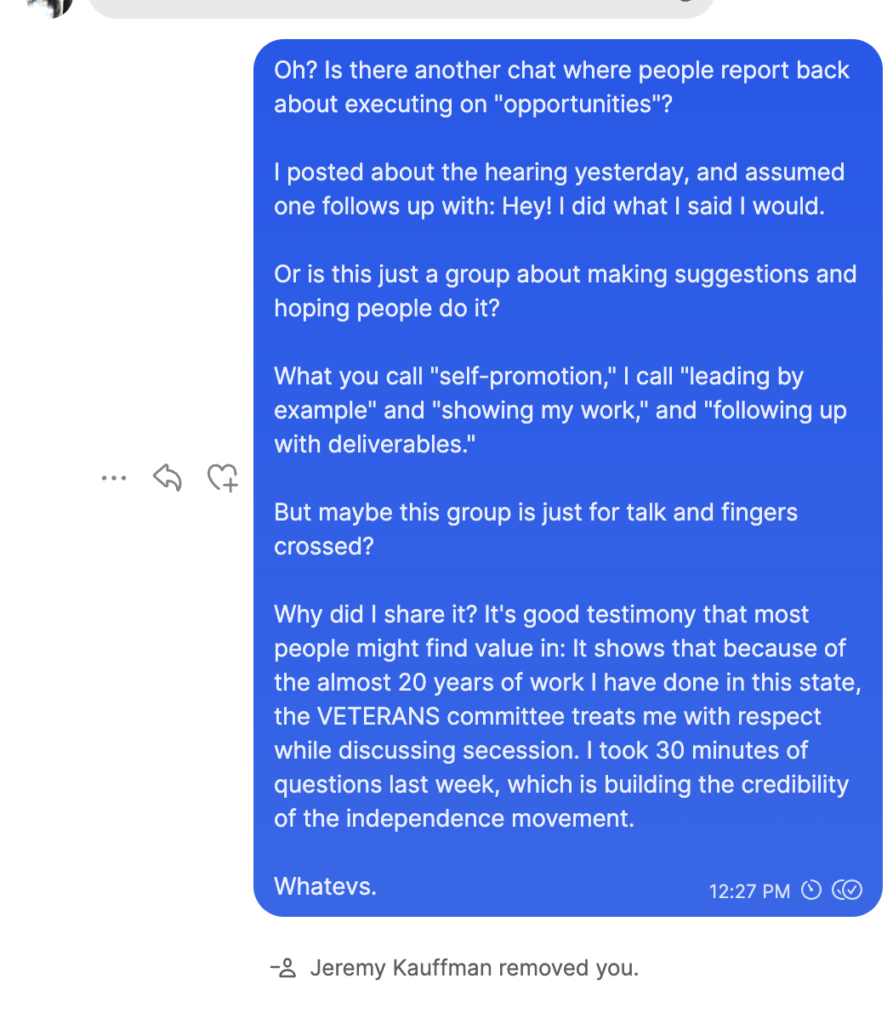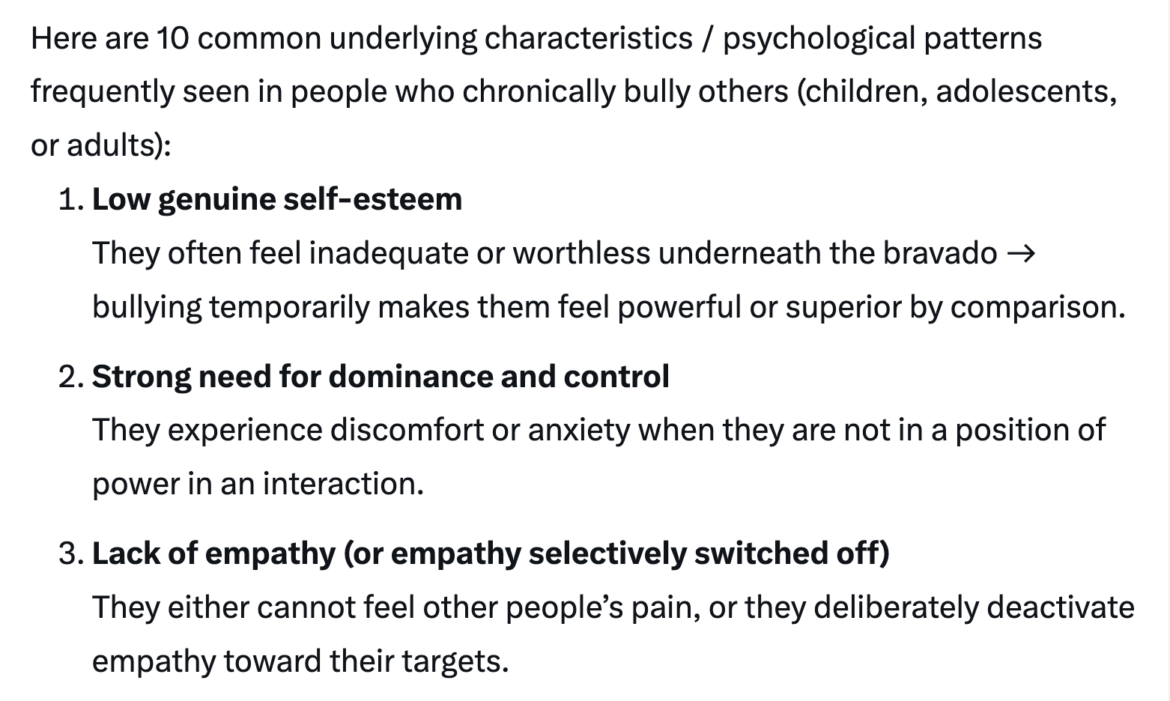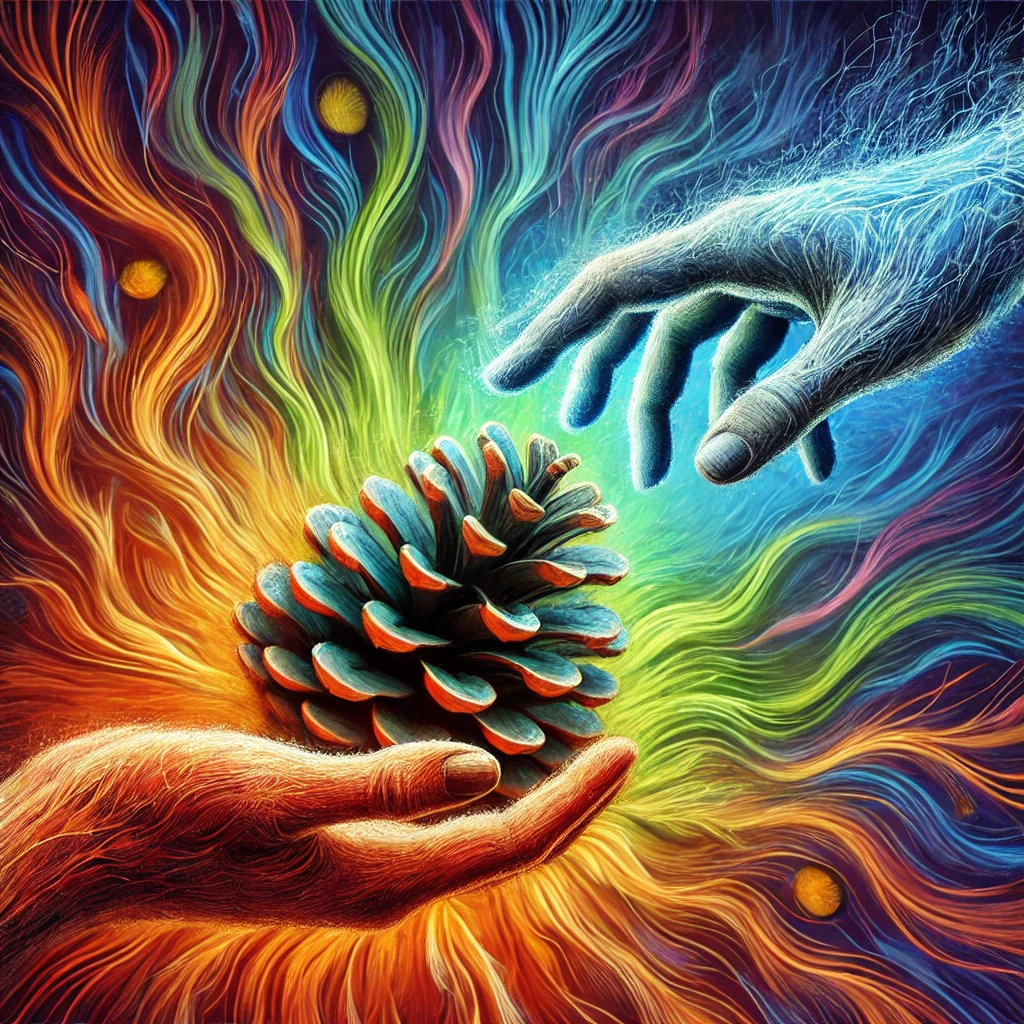There was a time when being accused of self-promotion would have landed in my body like a small electric shock.
A tightening.
A white flash in my brain.
That familiar reflex: Did I overstep? Did I make myself too visible? Should I shrink down?
That reflex didn’t fall from the sky. It was bred.
Bred by a lifetime of conditioning—be useful, but not loud; contribute, but don’t claim; lead, but don’t call yourself a leader; do the work, but don’t take the credit.
And if you are a woman?
Cheer.
Cheer.
Cheer.
That’s the kind of “leader” you’re allowed to be.
A woman in the male-dominated libertarian space? Good luck. The moment you showcase your work, small men will rush to label it self-promotion.
Recently, followers suggested I join a Signal group called SLACKTIVISM.
Once inside, I invited the so-called slacktivists to Friday’s HR33 hearing—House Resolution 33, a tactical bill supporting California’s request to divide into two states. Not symbolism. Strategy. A way to keep the conversation about independence alive in a hostile political environment.
After the bill’s sponsor, Glenn Bailey, and I testified that morning, I shared a link to the Veterans Committee’s YouTube stream in the group.
That’s when Kauffman went on the attack.
“Self-promotion.”
When I explained—briefly, clearly—why I shared it, I was immediately kicked out.

And that’s when I noticed something.
Nothing happened.
No spike.
No wobble.
No derailment.
No new brain loops.
Just clarity. My quick response. His even quicker boot—revealing exactly who was triggered, and who wasn’t.
Accusing someone of self-promotion only works on people who are unsure whether they deserve to take up space.
It’s a familiar bullying tactic.
Bullying doesn’t work on people who are aligned.
Bullying doesn’t work on people who know their worth.
Bullying doesn’t work on me.
What I shared was evidence of execution. Of follow-through. Of showing up to a legislative hearing, answering substantive questions, and being treated with seriousness and respect on a topic most people won’t touch with a ten-foot pole.
This isn’t just about promoting my ideas and solutions for the Free State. It’s receipts. Receipts for almost twenty years of grind. Day after day. My relentless fight for Liberty in My Lifetime.
Not “Left” or “Right”: LIBERTY.
Calling genuine, sustained contribution “self-promotion” is a psychological maneuver. It is a classic divide-and-conquer tactic: diminish visible achievements from people you dislike, force the group to choose sides, reframe leadership as ego, recast competence as vanity, and make any real action suspect—so that shit-talking can masquerade as real work.
Even GROK nailed it:
“This is textbook moral disengagement + envy-driven reframing: portray others’ agency and success as narcissistic self-aggrandizement. It neutralizes threat (the competent person), preserves the attacker’s fragile status, and enforces a norm where inaction/criticism is virtuous while action is vain. Reframe leadership as ego / competence as vanity → This is classic tall poppy syndrome tactics (cutting down anyone who stands out by portraying their success/effort as character flaws). It weaponizes cultural values like humility or teamwork against high performers.”
A few years ago, this tactic might have worked. At least a little.
Not anymore.
Some of the most empowering words I now live by are rational self-assessment. Only I get to measure me—and find me wanting. (See also: agency. Self-ownership.)

It’s no accident these bullying, sloppy, tall-poppy tactics show up most reliably on the fringes of the liberty movement—among those who preach freedom loudly while quietly enforcing status hierarchies, diminishing visible doers, and reframing competence as ego.
Compromised by the siren call of fleeting group power, some now even simp for the very federales they once despised. Seduced by the ring, they’ve become the authoritarians they claimed to fight—just bullies by another name.
I see the pattern clearly now.
My nervous system no longer revs at the attack. CBT didn’t teach me to suppress emotion—it taught me to notice when an external stimulus no longer owns my internal state. Alignment took it further: when thoughts, words, and actions are coherent, accusations slide off because there’s no inconsistency to grab.
Carla 1.0 might have spiraled. Defended. Gotten angry.
Carla 2.0 simply registers: Nope. Their behavior has zero claim on me or my path.
My quest continues—uncompromised. Free.
Trying to assert dominance by belittling visible effort isn’t a power move.
It isn’t leadership.
It’s insecurity.
I know, because that’s why I drank.
Now, alcohol-free for almost a decade, I don’t outsource my self-worth.
I know what I’ve built.
I know how long it took.
I know the difference between shit-posting and principled living.
My track record speaks for itself.
And when someone reaches for diminishment instead of engagement, it tells me far more about their internal landscape than mine.
Years ago, I would have swallowed that moment and carried it somewhere in my body.
Now, I let it pass through.
Not because I’ve become tougher—
but because I’ve become coherent.
Once you get here, attempts to belittle don’t wound you.
The receipts exist.
The belittlers reveal themselves.
They reveal the rot—inside and out. The broken system playing them. Their ensnared minds recycling toxic behavior inside a toxic structure they could transcend, if only they were willing to examine their inputs.
Instead, they try to crush those who have escaped.
Because, as the cliché goes: hurt people hurt people.
What they reveal is what I’ve already outgrown: True liberty isn’t found in left-wing, right-wing politics–wings of the same bird–it is found in your being.
Your being as embodied in your mind, body, soul, reflected in your thoughts, words, and deeds.
Ask yourself: Who am I? Why am I being like this? Why?
And finally, know this: You don’t have to be.












